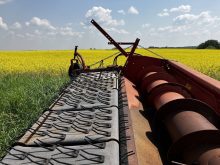(Resource News International) — Efforts between Canada’s oilseed processors and the U.S. Food and Drug Administration (FDA) to resolve canola meal blockages remain ongoing, industry officials said.
Some of Canada’s largest canola processors, including Bunge, ADM, Cargill and Viterra have seen their canola meal shipments blocked at the U.S. borderm where officials cite the presence of salmonella bacteria.
The Canadian Oilseed Processors Association (COPA) is working with the FDA to resolve this issue on behalf of the industry, a Viterra spokesman said.
Read Also

FMC Canada unveils 2026 crop protection roster
FMC Canada’s crop protection lineup for 2026 will include four products marketed for control of kochia.
“Viterra, meanwhile, is also continuing to work with COPA and the Canola Council of Canada to implement positive change,” the spokesman said.
The latest oilseed plant in Canada to have shipping restrictions placed on it is ADM’s facility at Windsor, Ont.
The FDA last Friday (Dec. 18) placed shipping restrictions on canola meal from the Windsor facility after detecting traces of salmonella in meal produced there, ADM media relations manager Roman Blahoski confirmed.
ADM Agri-Industries immediately shut down the facility and cleaned it extensively, he said.
“The company expects to resume shipping to the U.S. once it meets all FDA protocols,” said Blahoski, who works out of ADM’s head office at Dectaur, Ill.
All of the Canadian oilseed processors mentioned at some point have had samples of canola meal that came back positive for salmonella bacteria in routine samples taken by the FDA.
Numerous shipments from the various processors have been rejected since April 2009, according to information provided by a FDA import refusal report.
When the FDA has a product sample that comes back positive for salmonella, future shipments of that product from that particular manufacturer are subject to detention when they enter the U.S.
The detention of that product will continue for each subsequent shipment until the firm in question has shown to the FDA that it has controlled the problem.
“Corrective actions”
Included in the process is the submission of that firm’s information and the steps which were taken to correct the problem that led to the detention.
“So if the companies take the corrective actions, or if they changed any of their procedures, or added steps, they would provide that information to the FDA,” said John Verbeten, operations and policy branch director for the FDA at Rockville, Maryland.
“They would also provide information with respect to the samples of the product
collected at the time of entry into the U.S.”
The FDA uses that information to verify the steps taken by the firm were adequate to control the problem, he said.
Once the firms have proved to the FDA that the issue has been resolved, the detentions on the product’s entry from that particular company into the U.S. will be lifted.
Dave Hickling, vice-president for canola utilization at the Canola Council of Canada, said efforts were being made to work with the FDA to resolve the issue. Both short- and long-term measures to address the situation were in the process, he said.
The council has been monitoring the situation and also has been included on a technical committee working on resolving the problem, Hickling said.
As part of the short-term work, efforts were underway to reduce the amount of paperwork involved in the process, he said.
Efforts to improve the amount of time the FDA will hold onto a rail car or truck when it takes samples was also being considered.
Hickling noted that when the FDA holds a cargo for sampling, the process can take up to 30 days.
“Canada’s canola crushing industry is working hard to abide by the rules established by the FDA,” Hickling said.
COPA officials were not available for comment. COPA officials previously said that because the bacteria is extremely common and has many levels and forms of infection, it is hard to know what exactly the FDA is looking for.
The cause of the infection can also be tied to the type of containers used for transport, rail cars, storage for the canola meal and a whole host of other potential reasons that will need to be examined.














